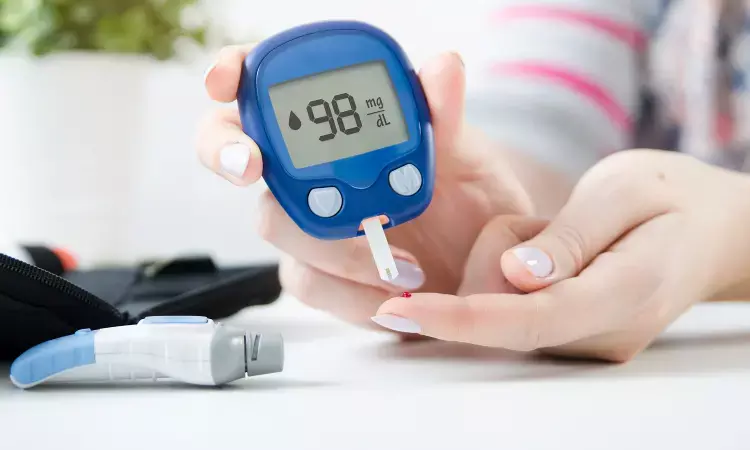- Home
- Medical news & Guidelines
- Anesthesiology
- Cardiology and CTVS
- Critical Care
- Dentistry
- Dermatology
- Diabetes and Endocrinology
- ENT
- Gastroenterology
- Medicine
- Nephrology
- Neurology
- Obstretics-Gynaecology
- Oncology
- Ophthalmology
- Orthopaedics
- Pediatrics-Neonatology
- Psychiatry
- Pulmonology
- Radiology
- Surgery
- Urology
- Laboratory Medicine
- Diet
- Nursing
- Paramedical
- Physiotherapy
- Health news
- Fact Check
- Bone Health Fact Check
- Brain Health Fact Check
- Cancer Related Fact Check
- Child Care Fact Check
- Dental and oral health fact check
- Diabetes and metabolic health fact check
- Diet and Nutrition Fact Check
- Eye and ENT Care Fact Check
- Fitness fact check
- Gut health fact check
- Heart health fact check
- Kidney health fact check
- Medical education fact check
- Men's health fact check
- Respiratory fact check
- Skin and hair care fact check
- Vaccine and Immunization fact check
- Women's health fact check
- AYUSH
- State News
- Andaman and Nicobar Islands
- Andhra Pradesh
- Arunachal Pradesh
- Assam
- Bihar
- Chandigarh
- Chattisgarh
- Dadra and Nagar Haveli
- Daman and Diu
- Delhi
- Goa
- Gujarat
- Haryana
- Himachal Pradesh
- Jammu & Kashmir
- Jharkhand
- Karnataka
- Kerala
- Ladakh
- Lakshadweep
- Madhya Pradesh
- Maharashtra
- Manipur
- Meghalaya
- Mizoram
- Nagaland
- Odisha
- Puducherry
- Punjab
- Rajasthan
- Sikkim
- Tamil Nadu
- Telangana
- Tripura
- Uttar Pradesh
- Uttrakhand
- West Bengal
- Medical Education
- Industry
Lower Vitamin K2 levels linked to uncontrolled hyperglycemia in type 2 diabetes

Egypt: Serum vitamin K2 level is significantly lower in type 2 diabetes (T2D) patients, especially with uncontrolled hyperglycemia, a recent study has revealed. The findings, published in the Indian Journal of Endocrinology and Metabolism, indicate that vitamin K2 level is associated with glycemic status in T2D patients.
Previous studies have shown that vitamin K lowers the risk of type 2 diabetes and metabolic syndrome through its ability to improve glucose metabolism and insulin sensitivity. Mona Yousry Helmy, Lecturer of internal medicine, Faculty of Medicine, Cairo University, Egypt, in their research aimed to investigate vitamin K2 level link to glycaemic status in type 2 diabetes mellitus patients.
The study included sixty T2DM patients. They were divided into 30 uncontrolled T2DM (group I), 30 controlled T2DM (group II) patients, and 30 non-diabetic subjects as the control group. They documented fasting insulin, vitamin K2 level, fasting blood glucose (FBG), homeostasis model assessment insulin resistance (HOMA-IR), 2-h postprandial blood glucose (PPG), glycosylated hemoglobin (HbA1c), and fasting lipids. Body mass index (BMI) was calculated and waist circumference (WC) was measured.
The study led to the following findings:
- A highly significant difference between groups was observed in vitamin K2 levels being 1.61 ± 0.56 ng/ml, 2.04 ± 0.59 ng/ml, and 2.96 ± 0.82 ng/ml for groups I, II and III, respectively.
- Among diabetics, a negative correlation was reported between serum vitamin K2 and FBG (r -0.428), 2-h PPBG (r -0.319), HbA1c (r -0.268), fasting insulin (r -0.49), HOMA-IR (r -0.5), total cholesterol (T-cholesterol) (r -0.335) and LDL-C (r -0.296).
- The receiver operating characteristic (ROC) curve emphasized the utility of the discriminated potentiality of serum vitamin K2 as a biomarker for uncontrolled hyperglycemia in T2DM.
- The multivariate linear regression has shown that FBG is the only significant independent predictor of serum levels of vitamin K2.
"These findings raise the concern about the relationship between vitamin K2 level and the glycaemic state in T2DM," the authors concluded.
Reference:
Helmy, Mona Yousry,; Elsaid, Nehal Hamdy; Gwad, Marwa Mohammed Abdel1 The Association of Vitamin K2 Level with the Glycaemic Status in Type 2 Diabetic Patients: A Case-Control Study, Indian Journal of Endocrinology and Metabolism: Jan–Feb 2022 - Volume 26 - Issue 1 - p 87-92 doi: 10.4103/ijem.ijem_470_21
Dr Kamal Kant Kohli-MBBS, DTCD- a chest specialist with more than 30 years of practice and a flair for writing clinical articles, Dr Kamal Kant Kohli joined Medical Dialogues as a Chief Editor of Medical News. Besides writing articles, as an editor, he proofreads and verifies all the medical content published on Medical Dialogues including those coming from journals, studies,medical conferences,guidelines etc. Email: drkohli@medicaldialogues.in. Contact no. 011-43720751


